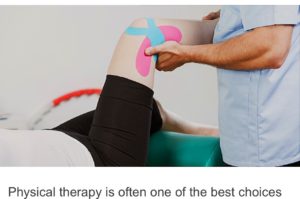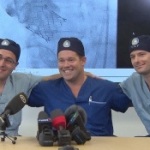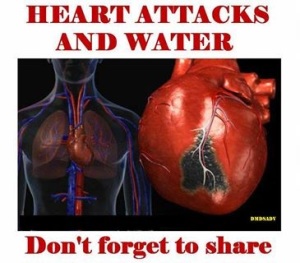What to eat to prevent Cancers?
YouTube TED TALK Press here
KNEE PAIN
8 Knee Exercises to Help Prevent More Injuries
Slideshow: Exercises to Help Knee Pain in Pictures
The only thing ! 
A terrific invention. No need of stem or bypass anymore.
Click on the
xxxxx Face book New technology to treat Heart disease
Oz’s operating room
Heart-Lung machine

Sister -Theresa awake during her Livestreamed Heart Surgery
Cardiologist Dr. David Wood, centre, and two members of his
team spoke with reporters following Monday’s successful operation on
Sister Theresa Stickley. (CBC)
Less than an hour after having heart surgery on Monday, Sister Theresa Stickley was alert and in high spirits, and was looking forward to going home the next day.
“I’m feeling pretty good. I had a little pressure in the chest, that’s all,” the 83-year-old woman told reporters from her hospital Pbed, with the lead surgeon by her side.
Sister Theresa Stickley, was in good spirits just an hour after having a heart valve replaced on Monday, Oct. 27, 2014. Her doctors said she may be well enough to go home to Squamish the next day. (CBC)
“When he told me there’d be cameras, I thought ‘oh my goodness sake, just keep me covered,'” she said.
Sister Theresa’s aortic valve replacement operation, which went beautifully, was remarkable in that it was broadcast in real time and observed by hundreds of cardiologists at the 2014 Canadian Cardiovascular Congress in Vancouver.
It was even more remarkable due to the fact that the Squamish-based Sister was awake during the entire procedure.
Surgery doesn’t entail breaking the sternum
The surgery marks a stark departure from the standard valve replacement operation of a decade ago, in which doctors would have had to break open her sternum, or breastbone, and she would have been recovering in hospital for more than two weeks afterward. A full recovery could have taken up to six months.
Sister Theresa Stickley’s heart valve replacement surgery was livestreamed to viewers at the 2014 Canadian Cardiovascular Congress in Vancouver, B.C. (CBC)
But in 2005, B.C. doctors pioneered a new procedure that threaded a replacement valve up to a patient’s heart using a catheter inserted into the artery just above the leg.
The technique revolutionized the surgery, and now a team of B.C. cardiologists, including Dr. David Wood, is taking what they believe is the next step forward.
“The innovation done here at the Centre for Heart Valve Innovation is stripping that procedure down to its bare essentials,” he said.
Using only a local anaesthetic, patients are wide awake during the surgery. Post-surgery recovery time is usually less than a day.
Cardiologist Dr. David Wood, centre, and two members of his team spoke with reporters following Monday’s successful operation on Sister Theresa Stickley. (CBC)
“As you saw the case took about half an hour, and she’ll be mobilized about four hours later and, if she’s like the other patients, about over three-quarters will go home the next day—and why that’s critical is that you don’t pick up infections, you don’t have any complications,” he said.
In a pilot study, the one-year survival rate went from a 75 to 93 per cent. A clinical trial is about to get underway in 10 centres across North America and by the spring of 2016 the procedure, which also cuts health system costs, could be used in hospitals around the world.
“The economic, potential implications are just staggering,” Wood said.
With files from the CBC’s Deborah Goble
How many folks do you know who say they don’t want to drink anything before going to bed because they’ll have to get up during the night.
Heart Attack and Water – I never knew all of this ! Interesting…….
Something else I didn’t know … I asked my Doctor why people need to urinate so much at night time. Answer from my Cardiac Doctor – Gravity holds water in the lower part of your body when you are upright (legs swell). When you lie down and the lower body (legs and etc) seeks level with the kidneys, it is then that the kidneys remove the water because it is easier. This then ties in with the last statement!
I knew you need your minimum water to help flush the toxins out of your body, but this was news to me. Correct time to drink water…
Very Important. From A Cardiac Specialist!
Drinking water at a certain time maximizes its effectiveness on the body
2 glasses of water after waking up – helps activate internal organs
1 glass of water 30 minutes before a meal – helps digestion
1 glass of water before taking a bath – helps lower blood pressure
1 glass of water before going to bed – avoids stroke or heart attack
I can also add to this… My Physician told me that water at bed time will also help prevent night time leg cramps. Your leg muscles are seeking hydration when they cramp and wake you up with a Charlie Horse.
Mayo Clinic Aspirin Dr. Virend Somers, is a Cardiologist from the Mayo Clinic, who is lead author of the report in the July 29, 2008 issue of the Journal of the American College of Cardiology.
Most heart attacks occur in the day, generally between 6 A.M. and noon. Having one during the night,when the heart should be most at rest, means that something unusual happened. Somers and his colleagues have been working for a decade to show that sleep apnea is to blame.
1. If you take an aspirin or a baby aspirin once a day, take it at night.
The reason: Aspirin has a 24-hour “half-life”; therefore, if most heart attacks happen in the wee hours of the morning, the Aspirin would be strongest in your system.
2. FYI, Aspirin lasts a really long time in your medicine chest, for years, (when it gets old, it smells like vinegar).
Please read on…
Something that we can do to help ourselves – nice to know. Bayer is making crystal aspirin to dissolve instantly on the tongue.
They work much faster than the tablets.
Why keep Aspirin by your bedside? It’s about Heart Attacks.
There are other symptoms of a heart attack, besides the pain on the left arm. One must also be aware of an intense pain on the chin, as well as nausea and lots of sweating; however, these symptoms may also occur less frequently.
Note: There may be NO pain in the chest during a heart attack.
The majority of people (about 60%) who had a heart attack during their sleep did not wake up. However, if it occurs, the chest pain may wake you up from your deep sleep.
If that happens, immediately dissolve two aspirins in your mouth and swallow them with a bit of water.
Afterwards: – Call 911. – Phone a neighbor or a family member who lives very close by.- Say “heart attack!” – Say that you have taken 2 Aspirins.
Take a seat on a chair or sofa near the front door, and wait for their arrival and …DO NOT LIE DOWN!
A Cardiologist has stated that if each person after receiving this e-mail, sends it to 10 people, probably one life could be saved!
I have already shared this information. What about you?
Do forward this message. It may save lives!





